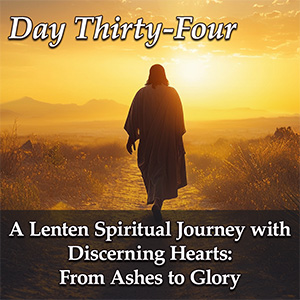Podcast: Play in new window | Download (Duration: 8:59 — 6.3MB) | Embed
Subscribe: Apple Podcasts | Spotify | Amazon Music | Android | Pandora | iHeartRadio | JioSaavn | Podchaser | Gaana | Podcast Index | Email | TuneIn | Deezer | Anghami | RSS | More

A Lenten Spiritual Journey with Discerning Hearts: From Ashes to Glory – Discerning Hearts Podcast
Day 34: Mercy Meets Us in Our Sin
Scripture Reading (Jerusalem Bible):
John 8:1–11 (Jerusalem Bible)
Jesus went to the Mount of Olives. At daybreak, He appeared in the Temple again; and as all the people came to Him, He sat down and began to teach them.
The scribes and Pharisees brought a woman along who had been caught committing adultery; and making her stand there in full view of everybody, they said to Jesus, “Master, this woman was caught in the very act of committing adultery, and Moses has ordered us in the Law to condemn women like this to death by stoning. What have you to say?”
They asked Him this as a test, looking for something to use against Him. But Jesus bent down and started writing on the ground with His finger. As they persisted with their question, He looked up and said, “If there is one of you who has not sinned, let him be the first to throw a stone at her.”
Then He bent down and wrote on the ground again. When they heard this, they went away one by one, beginning with the eldest, until Jesus was left alone with the woman, who remained standing there.
He looked up and said, “Woman, where are they? Has no one condemned you?”
“No one, sir,” she replied.
“Neither do I condemn you,” said Jesus. “Go away, and don’t sin any more.”
Reflection:
These final days of Lent ask something deeper of us. By now, we’ve tried to fast, to forgive, to pray more faithfully. But in that very effort, we’ve likely stumbled. We may feel weary, distracted, or discouraged. These are the very moments where God desires to meet us.
Today’s Gospel offers a scene of total exposure. The woman is brought before Jesus not in private, but in public shame. Yet what she finds is not condemnation—but mercy. Jesus does not excuse her sin, but He meets it with a gaze of compassion and a call to new life: “Neither do I condemn you. Go, and sin no more.”
This Gospel is meant for you and for me. We may not be dragged into the public square, but we all carry wounds, regrets, and patterns of sin that feel exposed before the Lord. He sees it all—and still does not turn away. The One who knows us best loves us most.
As St. Leo the Great wrote:
“The ineffable mercy of Christ wiped away the sins of the woman with a word, and in the place of guilt, sowed seeds of virtue.”
(Sermon 62 on Lent)
The scribes and Pharisees want justice—but Jesus offers restoration. He shifts the gaze from the woman’s guilt to the self-examination of the crowd. “Let the one without sin cast the first stone.” And slowly, silently, they walk away. This is not a story about someone else—it is a mirror for our own hearts. Lent is not about stone-throwing; it’s about heart-returning.
The Desert Father Abba Moses the Black said:
“The one who knows his sins is greater than the one who raises the dead.”
(Apophthegmata Patrum, Moses 11)
Honest self-knowledge born in prayer is the path to healing. This is why Lent calls us into practices that soften our hearts and open us to mercy. Silent prayer, especially before the Blessed Sacrament, begins this process. So too does the sacrament of Reconciliation, where we meet Christ not with punishment, but with peace.
St. Elizabeth of the Trinity beautifully captured the mystery of grace in her retreat Heaven in Faith:
“‘Abyss calls to abyss.’ It is there in the very depths that the divine impact takes place, where the abyss of our nothingness encounters the Abyss of mercy, the immensity of the all of God.”
Her words remind us that God meets us in the very depths—not where we are strong, but where we are most broken. There, in the silence and the sorrow, in the place of our failure and regret, God’s mercy does not merely meet us—it overwhelms us. We are not left in our misery. The abyss of divine mercy fills every emptiness with grace.
The invitation today is deeply personal: Jesus looks at you and asks, “Where are your accusers? Has no one condemned you?” And when we answer, He replies—not with wrath, but with mercy. The response He desires is trust.
Reflection Questions:
- Where do you feel most exposed or ashamed before God?
- Do you believe Jesus meets you there not to condemn, but to heal?
- What concrete step—perhaps silence, confession, or heartfelt prayer—can you take today to receive His mercy?
Closing Prayer:
Lord Jesus, You know my sin and still You love me. You look upon me with compassion and speak a word of mercy that makes me new. Help me to step out of shame and into grace. Cleanse my heart and restore my hope. Give me the courage to return to You fully, and to live in the freedom of Your forgiveness.
Amen.
This reflection is written by Kris McGregor of Discerning Hearts®. The Scripture passage is taken from the Jerusalem Bible (1966 edition), used with permission. No unauthorized use or reproduction is permitted without prior written consent.

